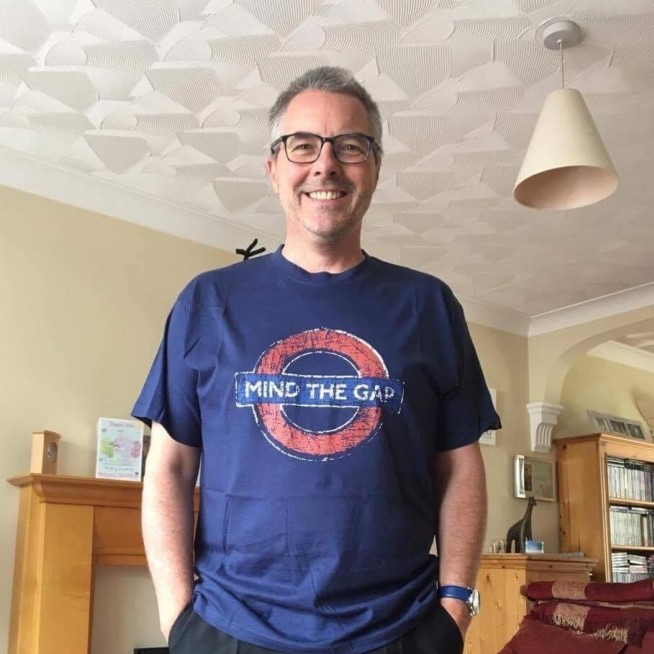Andy Tudor (Physics 1986) credits his Imperial degree for setting him up with the skills and confidence to succeed in his highly varied career across the engineering, technology, and business sectors.
Having reached senior management level, and achieving his final career goal to retire early at 55, Andy reflects back over how his career began, reminisces on his achievements so far, and shares some words of wisdom.

Why did you choose to study physics at Imperial?
At school I found physics by far the most interesting subject, and I had a brilliant teacher. I wanted to explore the subject fully and really stretch myself by choosing a top university.
What was the best part of your course and what was the most challenging?
One of my favourites is the eureka moment I had when Special Relativity finally made sense – wow!
However, the course was really difficult and many of my peers seemed much more academically gifted than me. Admittedly, it took a good year before I truly felt like I belonged on the course.
Were you involved in any extra-curricular activities?
I did social cricket, enjoyed a bit of rowing, and often played football with other students in Hyde Park on the weekends. I also helped run the bar in Linstead Hall.
Generally, I loved exploring London and going to the occasional party!
What is your fondest memory of your time here?
It would have to be when a load of us ‘tiddly-winked’ down Oxford Street during one RAG week, in amongst all the amazed shoppers!
What is your favourite place at Imperial and why?
The basement space of the Blackett (Physics) building, which felt like a secret hideaway in the middle of an otherwise very hectic universe!
Tell us about your career journey since graduating from Imperial.
Straight after graduating I joined GEC, which became Marconi and eventually BAE Systems, as a Graduate Systems Engineer. Over the next 21 years I worked my way up through a number of roles and eventually became Engineering Director within the leadership team of a major business division within BAE Systems.
Along the way, I also completed a diploma in managing integrated projects and became a Fellow of the Institute of Engineering and Technology (IET).
I then joined QinetiQ for the next 11 years, taking up a number of senior management roles including Operations Director, Engineering Director, and Lead Software Technical Assurer across the group.
I recently achieved my final career goal of retiring early at 55 so I could enjoy pursuing other interests on my terms.
What does a typical day look like for you now?
As I’m now retired, I fill my time with voluntary work for the Brain Tumour Charity, and I like to read and walk every day. In a post-coronavirus world, my aim is to travel extensively both within the UK and worldwide.
What have been your career highlights and lowlights so far?
My highlights have included my many roles in senior management - leading groups of up to 250 multi-disciplinary engineers and acting as the engineering focal point for large businesses. I’d also have to include my time as the Site Manager for MoD Boscombe Down, which has the largest working military airport in the UK, winning several Chairman’s Awards in BAE Systems, and having brought many new technologies to market.
Lowlights that come to mind are having had to inform colleagues they were losing their jobs, which is often a downside of senior management. There were also occasions where I myself was at risk, and I had to deal with the challenge of seeking alternative roles before being let go, which I thankfully managed to push through on each occasion.
How has what you learnt at Imperial helped you in your career so far?
Physics at Imperial taught me to look at multiple, disparate sources of information and make sense of it all to derive meaningful outcomes. This experience served me extremely well in most aspects of my technical and leadership roles.
I also often drew on the logic that if I could achieve a degree in physics at Imperial, I could surely tackle most issues likely to arise in an engineering or business career!
What are your plans for the future?
I aim to expand my charity involvement to help others less fortunate than myself.
What would be your advice for current students?
Make the most of the whole Imperial experience and look beyond your immediate subject to see everything else that is on offer. I passionately believe that life is not a dress rehearsal, so dive in to as much as you can and never be afraid to give something a try – this applies to both Imperial as well as your career. Never let a challenge pass you by!
What would be your advice to students considering studying physics at Imperial?
Go for it! Physics – particularly at Imperial, is arguably the best subject for developing an all-round skill set that will equip you for a challenging and fulfilling onwards career.
Oh, and London is a blast!
What makes you proud to be an Imperial alumnus?
I’m extremely proud of what I achieved in getting my physics degree at Imperial. When my teenage children realised that I went to Imperial they were amazed, given the current stratospheric A-Level entry criteria, and since it is consistently ranked one of the top universities in the world.
Is there anything else you’d like to share?
Thank you for giving me the opportunity to tell my story, and to pass my advice on to others who may also be so lucky to be starting their own Imperial journey.
Can we connect with you?
Find me on Twitter! @AndyHTudor1
Advice from Andy
"I passionately believe that life is not a dress rehearsal, so dive in to as much as you can and never be afraid to give something a try ... Never let a challenge pass you by!"